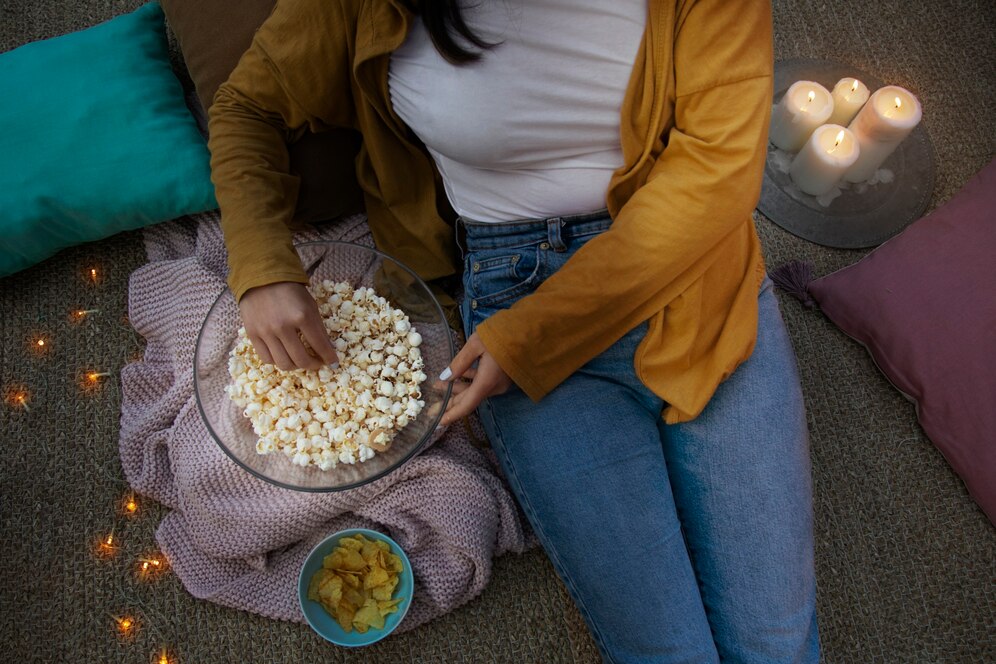Contents
- 1 Feel-Good Movies on Netflix and Amazon Prime
- 1.1 The Magic of Relatable Characters
- 1.2 Visuals That Hug the Eyes
- 1.3 Dialogues That Feel Like Letters
- 1.4 Background Music That Heals
- 1.5 Slow Stories That Soothe
- 1.6 Top 10 Feel-Good Movies on Netflix
- 1.7 Feel-Good Movies on Netflix Hindi
- 1.8 Funny Feel-Good Movies on Netflix
- 1.9 Feel-Good Movies on Netflix with High IMDb Ratings
- 1.10 Feel-Good Family Movies on Netflix
- 1.11 FAQs
- 1.11.1 What makes a movie feel comforting?
- 1.11.2 Are there any Indian movies that are good comfort watches?
- 1.11.3 Where can I find aesthetically soothing movies?
- 1.11.4 What type of music is used in comfort films?
- 1.11.5 Can slow-paced films really help with stress or anxiety?
- 1.11.6 Are feel-good movies suitable for repeated watching?
- 1.12 Related Articles
Feel-Good Movies on Netflix and Amazon Prime
Watching a film can do more than entertain; it can heal, soothe, and make you feel grounded. Comfort movies, the ones we revisit when life feels heavy, are defined not by box-office success but by the emotional safety they provide. They wrap you in warmth, let you breathe, and remind you of the beauty in ordinary moments.
The Magic of Relatable Characters
What makes comfort movies so enduring is their relatable characters. They are not superheroes or geniuses; they are messy, uncertain, and figuring life out slowly, just like us. Films like Dear Zindagi, The Lunchbox, and Kapoor & Sons thrive on honesty. Watching Alia Bhatt navigate emotions or Irrfan Khan’s quiet strength is like talking to an old friend.
These movies are not designed to impress—they are made to relate. You can find emotionally rich stories on Netflix and Amazon Prime Video, where searching for terms like “comfort movies,” “feel-good drama,” or “Hindi feel-good movies” will bring up films perfect for any mood.
Visuals That Hug the Eyes
A comforting movie often looks as warm as it feels. Soft sunlight filtering through curtains, pastel-toned kitchens, fairy lights twinkling in a room—these visual elements evoke calm. Films such as Amélie and Julie & Julia are cinematic paintings in motion. The beauty of ordinary moments—the steam rising from a cup of tea, a simple stroll in a park—is amplified through these visuals.
Dialogues That Feel Like Letters
The right line at the right moment can linger long after the screen fades. In The Lunchbox, the line “Sometimes the wrong train takes you to the right station” offers hope when you need it most. Comfort movies use dialogues like handwritten letters, quietly reminding viewers of empathy, resilience, and connection.
Platforms like BookMyShow Stream showcase independent and international gems where soulful dialogues take center stage.
Background Music That Heals
Music in comfort movies acts as a silent friend. A soft piano melody or an acoustic guitar humming in the background can evoke deep emotions. Films like Piku or About Time masterfully use background scores to guide viewers gently through narratives.
Streaming services such as Spotify and Gaana offer playlists specifically curated for feel-good movies, allowing you to experience these soundscapes even outside the cinema.
Slow Stories That Soothe
Unlike thrillers or action-packed blockbusters, comfort films embrace a slow-burn storytelling style. The pace mirrors life itself—long walks, casual conversations, quiet meals. About Time exemplifies this approach, emphasizing the characters’ emotions over plot-driven surprises.
Slow cinema can be found across platforms like Netflix and Amazon Prime Video under genres like “Drama,” “Romantic,” or “Independent.”
Top 10 Feel-Good Movies on Netflix
- The Lunchbox (2013) – A heartwarming tale of love and connection through letters, starring Irrfan Khan and Nimrat Kaur. High IMDb rating makes it a must-watch.
- Dear Zindagi (2016) – A story about self-discovery and mental health featuring Alia Bhatt and Shahrukh Khan.
- Piku (2015) – A quirky, endearing look at family dynamics starring Deepika Padukone and Amitabh Bachchan.
- Kapoor & Sons (2016) – A family drama with laughter, tears, and relatable sibling relationships.
- The Hundred-Foot Journey (2014) – Culinary delights meet cultural understanding in this visually pleasing drama.
- Julie & Julia (2009) – A double narrative connecting cooking, passion, and life changes.
- About Time (2013) – A gentle romantic story exploring time, love, and family bonds.
- Amélie (2001) – French cinema at its finest, a visual delight with an optimistic protagonist.
- To All the Boys I’ve Loved Before (2018) – A lighthearted teenage romance full of relatable moments.
- The Intern (2015) – Comedy and heartwarming lessons about life and work, starring Robert De Niro and Anne Hathaway.
Feel-Good Movies on Netflix Hindi
- Chhichhore (2019) – Nostalgic, funny, and emotionally resonant.
- Queen (2013) – A journey of self-empowerment and adventure.
- English Vinglish (2012) – Heartwarming story of self-confidence and family love.
- Nil Battey Sannata (2015) – A tale of hope, education, and family bonds.
Funny Feel-Good Movies on Netflix
- The Intern – Gentle humor and life lessons.
- To All the Boys I’ve Loved Before – Teenage romance with witty lines.
- Chhichhore – Mix of comedy and heartfelt nostalgia.
- Yes Day (2021) – Family-friendly fun with laughter and lessons.
Feel-Good Movies on Netflix with High IMDb Ratings
- The Lunchbox (8.0/10)
- Piku (7.6/10)
- About Time (7.8/10)
- Amélie (8.3/10)
- Julie & Julia (7.0/10)
Feel-Good Family Movies on Netflix
Family-oriented comfort movies are perfect for shared viewing experiences. Recommendations include:
- Paddington (2014)
- Yes Day (2021)
- The Hundred-Foot Journey (2014)
- Chef (2014)
- Wonder (2017)
FAQs
What makes a movie feel comforting?
A comforting movie has relatable characters, gentle visuals, soothing music, and a slower pace. It feels familiar, safe, and emotionally grounding.
Are there any Indian movies that are good comfort watches?
Yes, films like Dear Zindagi, The Lunchbox, Piku, and Kapoor & Sons are widely loved for emotional warmth and grounded storytelling.
Where can I find aesthetically soothing movies?
Netflix and Amazon Prime Video also offer curated sections under “Feel-good” or “Relaxing” genres.
What type of music is used in comfort films?
Comfort films often feature soft background scores such as piano, acoustic guitar, or ambient soundtracks that support emotions subtly. Spotify and Gaana have many curated playlists for these movies.
Can slow-paced films really help with stress or anxiety?
Absolutely. Slow films offer emotional pauses, helping viewers reset mentally. Relatable characters in quiet, thoughtful scenes often have a therapeutic effect.
Are feel-good movies suitable for repeated watching?
Yes. Comfort movies are made for revisiting. Each viewing offers warmth, familiarity, and reassurance, making them perfect for stressful times.





